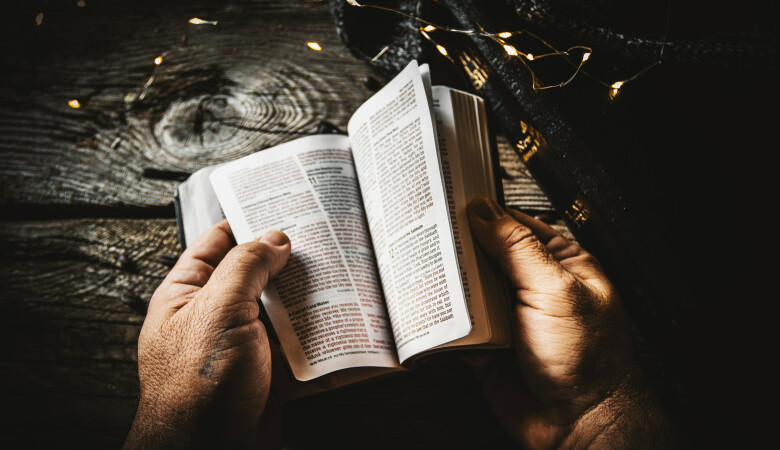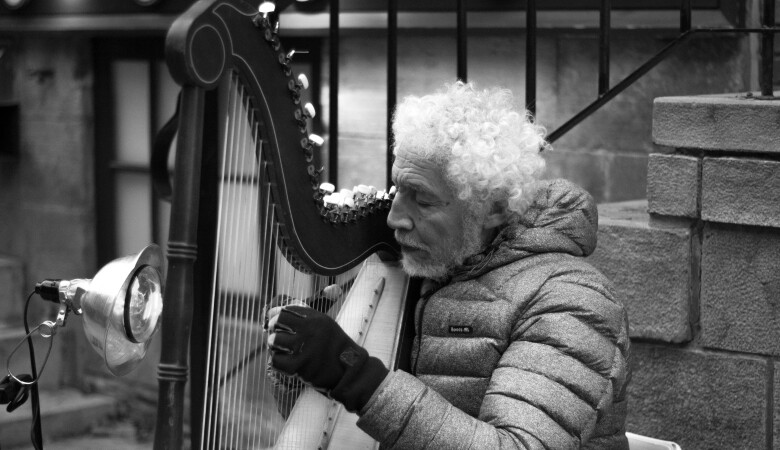Trusting Your Heavenly Father: Jesus Protects Us From Anxiety (Matthew Sermon 19 of 151)
June 06, 1999 | Andy Davis
Matthew 6:25-34
Introduction
Today we're going to be looking at verses 25 through 34 of Matthew chapter 6, and we're going to be talking about the topic of anxiety, worry. We just had an opportunity to talk together with some international students. We were talking about things that were common all around the world. Wouldn't you say that anxiety or worry is something that everyone has to face? People want something relevant when they come here Sunday mornings. I can't think of anything more relevant than dealing with anxiety or worry. I would say it's just one of those common things in life. In order to lighten things up a bit, I'd like to begin by telling you a story of a time that I was anxious a long time ago when I was six years old. I don't know if any of you men my age played with GI Joes when you were a kid. I did. Maybe what you don't know about a GI Joe doll is that the muscular arms on each side of the GI Joe is connected by a rubber band through the center of the chest. What happens when you tear it apart is if you twirl the arm around enough times, the rubber band snaps and that's how you find out that it's connected by a rubber band. Then the arms both fall off and then you're left with a GI Joe that isn't much use except for perhaps clerical work. At any rate, my GI Joe was without two arms, and about maybe about a month and a half after that, I had the opportunity to slip on some sand and fall on some stairs and I broke my arm. My mother came out, feeling my left arm and told Dad who was standing over me, that she thought it was broken. At that moment, my little six-year-old imagination started to take off. I started to think and see, that's the whole thing with anxiety. It's a misuse of imagination. You begin thinking about things, and I said, "I'm going to lose my arm. I don't know what I'm going to do without my arm." I imagined myself without an arm, and GI Joe had a kind of a socket in there. I didn't know what it would look like or whatever, but I knew I was in trouble because my parents looked obviously worried. They took me to the hospital, the doctor came in, and to my six-year-old perception, he tried to break my arm off. All he was trying to do was set the arm, but I thought he was trying to break it off. He was obviously unsuccessful breaking it off, so he came in with some plaster stuff that he started putting around my arm. I had no idea what that had to do with taking my arm off. I was crying and upset, and he didn't know why because he said by then the pain should be subsiding, and they just didn't understand why I was so upset. I'm looking at him as he's putting the cast on, and I said, "When does it come off?" Well, that was my big mistake. You have to specify what you're talking about. I said, “When does it come off?” He said about six to eight weeks, we'll take it off.
Those were the longest six to eight weeks of my childhood. I was inconsolable. My parents bought me a new GI Joe. They bought me all kinds of stuff, and I was very upset, I wasn't eating much. I'm again thinking of life apart from my left arm. We went back to the doctor’s office after six or eight weeks, and he came in with these big scissors. I thought the moment of truth had finally come. I didn't know what all that purpose was, but the time had come for me to lose my arm. He cut the cast off and that was it. I said to my mom, "Is that it?" And she said, "Yeah, you're all healed." As children do, I moved on. About five years ago, I was talking to my mom, and I told her this story. She was rolling on the floor laughing. She didn't know until that day that that's what I was anxious about. The whole thing was I asked, "When does it come off?" See, you've got to specify your questions. The point is that it's a story about anxiety. It's about fear, and you can laugh at it, and you say it's just the imagination of a six-year-old, but isn't that where anxiety comes from? It comes from taking your mind and going out to the worst-case scenario.
Don’t be Anxious, God Provides
Jesus in Matthew 6:25-34 is laboring to talk us out of anxiety and into a mature faith. Let's look at those verses together. Verse 25, "Therefore I tell you, do not worry about your life, what you will eat or drink; or about your body, what you will wear. Is not life more important than food, and the body more important than clothes? Look at the birds of the air; they don't sow or reap or store away in barns, and yet your heavenly Father feeds them. Are you not much more valuable than they? Who of you by worrying can add a single hour to his life? And why do you worry about clothes? Look at the lilies of the field how they grow. They don't labor or spin. Yet I tell you that not even Solomon in all his splendor was dressed like one of these. Now if that is how God clothes the grass of the field, which is here today and tomorrow is thrown into the fire, will He not much more clothe you, oh you of little faith? So do not worry, saying, 'What shall we eat?' or 'What shall we drink?' or 'What shall we wear?' For the pagans run after all these things, and your heavenly Father knows that you need them. But seek first His kingdom and His righteousness, and all these things will be given to you as well. Therefore, do not worry about tomorrow, for tomorrow will worry about itself. Each day has enough trouble of its own."
I have wrestled with those verses. That's 10 verses full of more truth than you can deal with in the short amount of time that I have to talk to you about it. It actually overwhelms me. It's just incredible how much Jesus labors to get us up out of anxiety and worry and into a position of strong faith and confidence in our heavenly Father. He begins with the Word, therefore. He says, "Therefore I tell you." That connects it back in context to what we were just talking about last time in verses 19 - 24. Therefore, because we should be storing up treasure in heaven and not on earth, therefore because we should not be serving money, but rather God, therefore because of these things, because of this that I've been saying to you, I tell you do not worry. There's a connection between the two, and I think the context is so beautiful.
In verses 19 - 24, He's talking about the temptation we have toward materialism, to run after luxuries, storing up riches on earth. He's speaking to those perhaps that are more wealthy and have the possibility of doing that. That they should not be materialistic or live for that. Then He flips the other side of the coin and speaks to those who are perhaps more poor and, in these verses, He talks about those that run after necessities, not luxuries, those that are concerned about daily food and clothing. He says to them that they should not live for these things either; neither should you live for luxuries nor necessities. That's not what your life is about, so He attacks not materialism here, but anxiety, but it really is two sides of the same coin, a focus on material things here on earth that He's trying to talk us out of.
Don’t be Anxious, But Live for God’s Kingdom
The unifying theme in the whole chapter is living for the kingdom of God. Our motivation should be that at every moment, we're living for the glorious kingdom of God. That that's the only purpose worthy of our lives. He's lifting us up and so the centerpiece verse, Matthew 6:33, “seek first His kingdom and His righteousness” really unifies the whole chapter. That's the context of this statement. We have to ask ourselves, since we're talking about the potential or the possibility of a worry-free life, we have to ask, is it really possible? Is it really feasible that we could move through this troublesome world worry-free, free of anxiety? Think of all the troubles. You got ecological problems in the world, global warming. If you get concerned about that, still there's a threat of nuclear weapons. They're still out there. Maybe some terrorist groups could get hold of one. Rampant economic problems worldwide. They haven't touched our stock market as much, but maybe the stock market is just a bubble economy that's going to pop at some point. You see how the imagination works. We get so concerned about these things. The world is out there. What about right here where I live? Maybe you're having marital problems. Maybe there's the threat of divorce or some kind of struggle there. Maybe you're having trouble raising your kids. Maybe there's some wrestling or some struggle there. Maybe you're afraid of car trouble. All different kinds of things could happen.
Is it really possible to move through this world worry free? Jesus says it is, and He says that we must not worry. He says do not be anxious or do not worry. I don't know if any of you have the King James Version, but there it says, “take no thought for your life.” Doesn't that really bring us right into the issue of anxiety and worry? It's a matter of what you think about. It's a matter of the thinking. Take no thought for your life. The problem with the King James Version is that the shifting of meanings in English has moved along since that was written. Back then, they understood that take no thought for your life meant don't be anxious about it. What does it mean? We shouldn't plan? You shouldn't have life insurance? You shouldn't be looking ahead of the future? You shouldn't have a bank account? That's taking it too far. The point is the matter of anxiety or worry. It's a matter of fretting over things, it’s not a matter of whether you think about something or not. In the book of Proverbs, Proverbs holds up the ant as someone that we should be like. He stores up food in the summer for use in the winter. So, it's good to be diligent as it is to work hard.
There's a balance to this, but the point is thinking. And the Greek word in terms of worry or anxiety means to “divide the mind.” Have you ever felt when you're anxious that there's something like a debate going on inside of you? There's a kind of a pulling back and forth, the kind of an arguing inside you. It's a matter of a divided mind or perhaps for a believer, it's a matter of sometimes you trust God and sometimes you don't. There are some things you'll trust God for and some things you won't. For example, you'll trust God with your eternal soul, but you won't trust Him for your next meal. You see how foolish that is, but that's the whole thing. It's a matter of sometimes this, sometimes that. It's a divided mind. It really comes down to what you think about. If I were going to outline these 10 verses, I think it comes down to this. There's a general command given from our Lord and savior that we should not be anxious. He gives it three times. He supports the command with the constant view of the heavenly Father and the fact that you're in a kingdom.
He supports the command, and we can break it down into four reasons that we shouldn’t worry. Because we have a heavenly Father and because we live in His kingdom, we must not be anxious and further worry. Worry is contrary to our obedience, to our reason, to our faith and finally, and to our fruitfulness. I see all of that in the scripture.
Four Reasons We Shouldn’t Worry
Worry is Contrary to Our Obedience
Let's look first at the general command. Verse 25 says, “Therefore I tell you do not worry about your life, what you will eat or drink or about your body, what you will wear.” Now look down at verse 31. Do not worry, saying what shall we eat or what shall we drink, etcetera. Finally, in verse 34, “Therefore, do not worry about tomorrow.” Three times our king has commanded us not to be anxious, not to worry. That's pretty remarkable. In 10 short verses, we get the same thing stated three times, commanded three times. It is a command from the Lord. Then He supports the command with the central arguments, namely the idea that we have a heavenly Father. Then because it's a command, we're led right into the first way of thinking, contrary to obedience. In other words, worry is contrary to obedience. Let me ask you a question. Does the fact that Jesus as our king commands us not to be anxious teach us something about anxiety? Absolutely. It teaches you that you can in fact defeat anxiety. It is possible for you not to be anxious. He has commanded you and made it a matter of obedience. Perhaps you never thought of worry or anxiety as an act of disobedience, but it begins here when God gives us three commands that we should not be anxious, we should not worry. That we must labor not to be anxious and not to worry.
Actually, the command itself becomes a gateway to joy. If God has commanded it, we can obey it. We don't have to live racked with worry, racked with anxiety. We can live free from all that. Wouldn't every one of you like to check your anxieties in this room when you walk out the door and never lift them up again? This is something where obedience pays. Immediately to obeying this, you're free from all that fretting and that anxiety and worry. Jesus does command us. The essence of the kingdom is submission and obedience to the king. In John 14:15, Jesus says, "If you love me, you will obey what I command." Then He flips it around in Luke 6:46, when He says, "Why do you call me Lord, Lord and do not obey what I command you?" You can't call Jesus your Lord and not obey Him, and so we need to obey Him in this matter.
Worry is Contrary to Reason
But Jesus goes beyond that, and He shows us that worry is contrary to reason. Now, here we get really to the meat of the whole issue, the issue of reason. Christ as our king could simply command us, He could just tell us what to do. Any of you who have young children know that you're allowed to say, "Because I'm the daddy, that's why. Because I'm the mommy, that's why." That's okay. You can do it. There are times when they don't need to know why, and they just need to submit to authority. That's glorifying to God. But there are also times to explain why, because there's going to come a time when they're not going be under that kind of authority. They need to understand reason, so there's a balance to it. Here, Jesus seeks to reason us out of anxiety. He's talking to our thinking process. So much of Matthew 6:25-34 is an exercise in logic. It's an exercise in thinking. I'll show you what I mean. The basic underlying assumption is the idea that worry can be defeated by reason, by thinking it through, by proper thinking. That this is really a battle for the mind. 1 Corinthians 2:16 says, "We have the mind of Christ." When you become a Christian, you're given the ability to think like Jesus does. You're given a sanctified reasoning process. Therefore, in 2 Corinthians 10, it says that we're able to take captive every thought and make it obedient to Jesus Christ. You're able to control what you think about. All of you who have been anxious before know that's a whole battle. Are you really able to control what you think about? The Bible says you can. You can control what you're going to think about and what you're going to ponder and meditate on. How does Christ argue us or reason with us out of anxiety? How does He try to get us out? He uses logic.
Any of you who have studied reasoning know that He is using an a fortiori argument, an argument from the greater to the less, from the more significant to the less, from the more surprising to the less. He does this consistently. In other words, if this is true, how much more will that be true? For example, a young child seeing his strong father working outside says, "Well, if my dad can lift that 100-pound bag of concrete and carry it over there, how much more could he pick me up?" It’s an argument from the greater to the less. I weigh less than 100 pounds, if he can do that, he can do the other. It's a way of reasoning, a way of thinking. Jesus uses it frequently. Not just here, but later in Matthew 7:11, "Ask and it will be given to you. Seek and you will find." He's trying to talk us at that point into a faithful prayer life. He says, "Which of you fathers, if your son asks for bread will give you a stone? Or if he asks for a fish will give him a snake?" Then He says, "If you then, though you are evil, know how to give good gifts to your children," hear the words, "How much more will your heavenly Father give good gifts to those who ask Him?" If you know how to do that, God's better than you. He's more loving, more patient, more kind, cares more about His children than you do. How much more will He answer your prayers? It's a “how much more” argument. He does it time and again.
In another place, He said, "If the head of the house has been called Beelzebub, the Lord of Flies, how much more the members of the household?" In other words, if they treat me like this, what are they going to treat you like? The argument is about persecution, but he talks about it from an argument from the greater to the less. The apostle Paul used the same arguing technique. Romans 8:32, "He who did not spare his own son but gave him up for us all, how will he not also along with him graciously give us all things?" Can you imagine God, "All right, I'll give my Son, but I'm not going to give you enough to eat today.”? That doesn't make any sense. Of course, the Son is the most valuable thing in the world to him, his precious Son, and He sent him to die on the cross for your sin. Will He not much more do such and such? That's the way the argument works.
How does it work here in this passage? I think there's three examples of it. Verse 25 says, "Is not life more important than food and the body more important than clothing?" That's the first appeal to reason, the body is greater than food and clothing. This is how it works. God gave you a body, didn't he? All of you have bodies. Now, your body was created with certain physical needs. The cells inside your body are constantly needing nourishment. Do you think God doesn't know that? He made it that way. He made you fearfully and wonderfully. David said, “I praise you, oh Lord, for I am fearfully and wonderfully made." Well, God made you needy. He made you with this thing right in here that gets empty and full in a cyclical pattern that's somewhat predictable. It's a kind of a daily pattern. Gets full, gets empty again. Gets full, gets empty again. God gave you this body. Now, if God gave you the bigger, the greater gift of a body, will he not much more feed the body? You see how the logic works. Is not life more important than food? The body more important than clothing? The gift of life is a greater gift than food. The gift of a body is a greater gift than the gift of clothing. That's how it works. So, it doesn't make any sense to think that God wouldn't clothe it or feed it.
The second example of this kind of arguing comes with this, the children of God are greater than birds. Children of God are greater than birds. In verse 26, "Look at the birds of the air, they don't sow or reap or store away in barns, yet your heavenly Father feeds them. Will he not much more feed you?” You see, that's how the argument works. At this point, Jesus, if you can imagine him is sitting up on the mount [the Sermon on the Mount], and He's out in nature. I think at that moment you can imagine that maybe some birds came fluttering by. Jesus said, “They don't sow or reap or store away in barns, yet your heavenly father feeds them. Observe, look at them.” The Greek word for “look” here is a matter of study. Look at them carefully. Don't just say, “Oh, yeah, there's some birds flying by.” Look at how they live. They don't have the technology to plan ahead to the future to have a harvest of wheat or barley or other things and yet God feeds them. Will he not much more feed you? So often I think we just move through life with our head down, mulling over our problems when the answer's flying by in the air right over our heads if you just know that God created the birds, and you are of greater value than the birds. He's caring for them, he'll care for you. That's how it works.
I did a little research on this. I was thinking about things that eat. I like to go big, so I went with the blue whale. You know the blue whale's the biggest animal on the face of the earth, 150 tons. I have no idea how much plankton a blue whale eats every day. But it's a matter of tons. I thought to myself, "My goodness, God has to feed all these blue whales." He's got to take care of them, and they seem to do alright. They grow to that incredible size. I found someone that had done research on plankton, and they estimate that in one year the seas produce 500 billion tons of plankton. 500 billion tons of plankton. God is feeding what he's made. God knows how to do that. Now if he can do that, surely, he'll take care of you. That's how the argument works.
The final way He uses this reasoning is in verse 28 concerning clothes. Children of God are greater than wildflowers. Isn't worry ridiculous? It should almost strike you as how ridiculous it is that we get worried about these things. Verse 28 says, "Why do you worry about clothes? Consider the lilies of the field. They don't labor or spin, yet I tell you that not even Solomon in all his splendor was dressed like one of these." If that is how God clothes the grass of the field, which is here today and tomorrow it's shriveled up, it's withered, it's thrown in the fire, it's nothing, how much more will He clothe you? O you who have so little faith.” This is the exact same argument as before. Argument from the greater to less. If God takes care of flowers, will he not much more take care of you?
Recently, I was on an RA retreat in Ridgecrest. Ridgecrest is a beautiful area on the western part of the state. We were on a mountain hike and knowing full well that in a matter of hours, I'm going to have to stand in front of you and I needed an illustration of God's glory, I was looking for flowers. I think wildflowers are amazing. I saw one that I couldn't identify but it had six sides to it, basically white, kind of a cup shape with little points coming out. On the underside, there's these little spiny, horny type things going down. I don't know what it was for. If you put your finger on the underside, it was sticky. The flower's basically white with pink tint around the edge, it was beautiful. In the center, on each petal, there was a vivid magenta dot where the pistil and the stamen were. Coming out of that were these strands going out and each one went to the center of that magenta dot and stuck there. So, I plucked this flower, and I didn't mean to do this, but I just pulled on the side and that thing sprang up like a catapult, and it sprayed me with a tiny little bit of pollen. I was looking really close to it, thankfully, it didn't land in my eye. But it sprang out like that. I said, "Wow! That's incredible." So, I pulled on each one, and then they're all up in the center. I said, "Boy, that's great!" I started calling other people and they started to look, and they started doing it too. The little kids were into it, they're pulling on it, little catapults going everywhere. I said, “Boy, that's incredible. I’ve got to show the people at First Baptist these flowers," so I plucked a big bunch of them and brought them home with me. By the time I got them home, I don't even want to tell you what they looked like, shriveled, brown, ugly. Here's this beautiful flower plucked. As soon as it's plucked, it begins to die. By the time the day was over, the flower was ugly, brown, and shriveled. Isn't that what Jesus said it would happen? It's here today, tomorrow it's thrown in the fire. It's nothing. Will God not much more clothe you? If he puts that kind of meticulous care into a throwaway flower, won't He care for you? He said Solomon can't compete with my flowers. I sense almost that kind of boasting that God does in his creation, that He does at the end of the Book of Job. Ever notice how He said, "Have you looked at this? Have you looked at that?" He said, "You can't compete with this." You may labor and spin but you're not even going to get close to this wildflower, the lilies of the field.
Now I was talking to somebody about this who said, "Oh, I know what you're going to say, that we ought to move through life and smell the flowers, shouldn't we?'" I think that's good, but Jesus does not command us here to smell the flowers, does He? What does He tell us to do to the flowers? Consider them. Meditate on them. Think about them. Study them. Don't just move through life with no mind. You're just ripe, right at that point for anxiety. Look at the world God has made and reason it out. That's how it works.
Then he ends up in terms of reason, saying in verse 27, "Who of you by worrying can add a single hour to his life?" It's also a matter of reason, isn't it? Does worry give you anything for your labor? What are your wages for your worrying? You get nothing. Jesus puts it this way. It's a little bit hard to translate this out of the Greek. But it's basically, “who of you can, by worrying, can add a single cubit to his span?” I think in context, there's two different ways of understanding span. It's either how tall and big you are or how long you live. I think it's really the latter. A cubit is 18 inches from the king's center of his forefinger, down to his elbow. What Jesus is saying here is, "Who of you can add even 18 inches to the course your life?" It's like you've got a race to run. When you reach the finish line, that's it. It's over. And your worrying will not extend it one cubit, not 18 inches. That's it. Worrying doesn't add anything to you. There's a limit to it. If anything, doctors will tell you that worry will shorten the span of your life. There's actually a detrimental physical side to it. You could have ulcers, nervous conditions, all kinds of physical trouble. It doesn't get you anything positive, but it may get you all kinds of negative things. So, He's reasoning with this.
Worry is Contrary to Faith
The next major way that He begins to talk us out of it is an appeal to faith. We get this in verse 30. “Oh, you of little faith.” In effect, He's saying to us, "Where is your faith?" I’s interesting that we should have a juxtaposition here of reason and faith. Some people look on reason and faith as being enemies, they really have nothing to do with each other. They talk about the leap of faith. Some of the existentialist theologians talk about the “leap of faith.” We actually covered the “leap of faith” early in Matthew's Gospel. Satan took Jesus to the top of the pinnacle of the temple and told him to leap down; that’s the “leap of faith.” When I think of the “leap of faith,” I think of the temptation to sin. The way that theologians speak of the “leap of faith”, they're saying, “Contrary to all reason, you're going to do such and such for God." That's not the way God works. Reason and faith actually work very closely together in the Scripture, they're actually good friends. If you look in the book of Hebrews 11, there’s this thing called the, "Hall of Faith,” an example of how faith works. I challenge you to go through and see how much reasoning and thinking there is in that chapter. It happens time and again. There’s the example of Abraham. Abraham was commanded by God to take his son, his only son, Isaac, and offer him up as a sacrifice. Abraham was thinking about it, and he obeyed. And what does it say? What was his motivation? In Hebrews 11:19, it says that "Abraham reasoned that God could raise the dead,” and figuratively speaking, he did receive Isaac back from dead. He reasoned it out.
Faith accepts unseen truths as true. There is a God, He is loving, He is kind and patient, He is a heavenly Father, etcetera. It accepts this data, then reason takes information, and extends it out, works with it, applies it to situations. That's how the two work together. A faith filled person accepts the truth of a God, and then reason moves it out to cover this situation, and that situation. They work together. It's interesting this phrase, "You of little faith." The phrase, “little faith,” appears four times in Matthew's Gospel. It appears here, then three other times with the disciples. I'd encourage you to look them up. Matthew 8:26 is a time that they were in the middle of a storm, tossing and turning. They think they're going to drown. They say to Jesus, "Save us. Don't you care that we're going to drown?" Jesus says, "You of little faith. Why are you afraid?" Then He rebukes the winds and the waves. Remember who it is that was being afraid at that moment. It was Peter, it was John and James, it was Andrew. What did they do for a living? They were fishermen. They spent their whole lives on that lake. Don't you think they knew when they were in serious trouble in the middle of a storm? And yet, Jesus rebuked their lack of faith. Can you find one example in the New Testament where Jesus comes upon somebody who is not exercising faith, and He coddles them out of it or comforts them or says, "Well, that's okay." Never. He always rebukes lack of faith. How can we not trust God after all he's done? Look at your life. However old you are, doesn't God have a track record of caring for you faithfully? How can we doubt him? That's what Jesus says.
The second time is in Matthew 14:31. It says, "Immediately, Jesus reached out to him and caught him." Who did he catch? He caught Peter, Peter walking on the water. Peter. "Lord, command me to come out to you on the waves,” and so he came out. He started walking on the water. All of a sudden, he looks around, starts to see the wind and the waves, and starts to sink. He becomes anxious. He becomes afraid. What did Jesus say to Peter? "You of little faith. Why are you afraid?”, and He reaches down and saves him. Have any of you ever walked on water? Peter had a command from God, that's like throwing yourself down off the temple. Peter was told by Jesus, "Come,” and he went. But once he got out there, it got a bit too much for him. What is this? In the midst of something even when you've stepped out of faith, and it's starting to overwhelm you, even then you're supposed to not doubt, but believe. You're supposed to trust. "You of little faith," He said.
Thirdly, in Matthew 16, "The disciples went across the lake, and they forgot to bring bread." Now, you say to yourself, "What's the big deal?" No grocery store there. When you forget to bring bread, you go hungry, unless of course you have the Lord with you. It was a bad mistake. What happens when people are in a group and somebody makes a bad mistake? The first phenomenon is called blame shifting. "Well, you were supposed to remind me." "Well, I thought it was your job," and this kind of thing. This is what they're doing, they're arguing back and forth, but they were kind of off away from Jesus because they were ashamed, they didn't want anyone to know that they had forgotten. Jesus knew what they were talking about. He was trying to teach them a spiritual lesson about the Pharisees and Sadducees, but they could not listen. Do you know why? Because anxiety and concern about material things takes your mind off spiritual things. You can't build the Kingdom of God that way. You can't seek first the Kingdom, you can't store up treasure in Heaven, when you're anxious about material things. It takes over. Jesus said, "You of little faith. Don't you understand that I can cover even your stupid mistakes?" Even when you make bad mistakes, forget to put the check in the mail and you have to pay a penalty, you forget to take care of car maintenance and you have to buy a new car, various other things; even when you make stupid mistakes, God is still faithful to take care of you. Meditate on Matthew 16:8. It can conquer more anxiety than probably any other. “Oh, you of little faith.” Jesus seeks at this point to talk us out of unbelief and to increase our faith.
Now, we get to this issue, "Okay, if we have little faith, how do we have more faith? How is our faith increased?" The disciples ask that question in Luke 17:5. They came to Jesus and said, "Lord, increase our faith. Please give us more faith." Jesus said, "Increase your faith? I tell you the truth, if you have faith as small as a mustard seed, you can say to this mulberry tree, ‘Be uprooted and planted in the sea,’ and it will be done." What is Jesus saying? It’s not a matter of amount, it's a matter of taking the faith you have and applying it to the specific situation under question. That's the issue. The idea of an infinite powerful God applied to the particular situation causing you anxiety, that's how faith is increased. Ultimately, faith comes from the Word of God. So, as you immerse your mind in scripture, as you understand what kind of God He is, understand His plans and His provisions, anxiety decreases; it goes away. You begin to trust more and see faith increases more when you simply use it.
The final aspect of faith is simply this, that we are to take our proper place in the universe. I thought long and hard about this expression, "Look at the birds of the air." Or "Consider the lilies of the field." Do you wonder why Jesus puts those little clauses at the end? He's saying the birds are made to fly through the air, look at Genesis 1. They're created to move through the Heavens, that's their natural place. He created, according to Genesis 1, the lilies for the field; that's their place. What is our place? We have a place. It's a place in the Kingdom of Heaven. We are believers, and we have a place, but we are not God. Neither are we lower than the animals. He said, "You are worth more than many sparrows." We have a certain place, we're higher, at the highest level of creation in this world; that's us. We're put at the pinnacle to rule over it. So, we're worth more than a sheep, he says in another place, worth more than many sparrows; we're worth more than wildflowers, worth more than birds. We're at that higher place, so we can't think too lowly of ourselves. But neither are we to think too highly of ourselves either.
It says in verse 34, "Therefore, do not worry about tomorrow, for tomorrow will worry about itself." How does that work? You believe that you are able to handle today's problems and tomorrow's. And not just that, but maybe, why don't you go ahead and heap on next year's problems, too; "I can handle that too." Actually, my mind, my imagination goes even further than that. Why don't we go out to five years, ten years? "Let God give it all to me today; I can handle it all today." No, you can't. Keep yourself in your proper place. Jesus says, "Each day has apportioned, cut out for itself, enough trouble for you to handle." Handle today's trouble. You can't handle... It's like moonlighting; you're going to go out and get a second job, and then a third job. You can't do it. There's a limit to what you can do. Keep yourself in your proper place.
Worry is Contrary to Fruitfulness
Of all of these, the greatest motivation has to do with fruitfulness. And that really does, as I say, unite the whole chapter. In verse 31, it says, "Do not worry, saying 'What shall we eat, or what shall we drink, or what shall we wear’, for the pagans run after all these things, and your Heavenly Father knows that you need them." Haven't we come across this argument before, the Kingdom life should be higher than pagan life? In Matthew we see that the Pagans greet only their friends; the pagans greet only their neighbors. You're supposed to be better than that. He said, "What are you doing more than others? You're supposed to be living at a higher level." It's the same thing with this argument concerning food and clothing. Pagans run after these things; you're not supposed to live for that. You're called up out of that. Let God take care of that stuff. You seek first the Kingdom of God, seek first His righteousness; that's what you should be living for, not for everyday material stuff that's going to decay and disappear. You have a higher call, a higher purpose.
Philippians 3:19 says, "The pagans’ destiny is destruction. Their God is stomach." Their God is their stomach? They live for their stomach, they worship it. They do everything they can to provide for their own physical needs. Their glories and their shame, their mind, is on earthly things, but your citizenship is in Heaven. You should be higher than that, at a different level. We are to live for the Kingdom of God and His righteousness. "Seek first the Kingdom of God, the Kingdom of Heaven and His righteousness, and all these things will be given to you as well." “Seek” means earnestly work after it; hunger for it; thirst for it. The part of your brain, the part of your being that was given to seeking, to imagination, to thinking, to reasoning, to planning and working, all of that gets hijacked by anxiety and used for something else. Get it back. Bring it back in and connect it to the Kingdom of Heaven and to God's righteousness, that's what it's for. Hunger and thirst for righteousness. Remember the Beatitudes? "Blessed are those who hunger and thirst for righteousness, for they will be filled." Hunger for it; thirst for it. Don't be concerned about other material things. That's how this whole thing works. Fruitfulness: we should be living for the Kingdom of heaven.
The kingdom of heaven is external, I believe, but it’s internal as well, that's his righteousness. External, in that the gospel is advancing and we're to be part of that. We're supposed to be taking the gospel to our neighbors. We're supposed to be building the church, even a local church like this one. We're supposed to be using our spiritual gifts. We're supposed to be having good works every day, serving and building the kingdom of heaven. But if we're anxious about material things, the quantity of good works goes down, perhaps even to nothing because every day, we're working for material things. Seek first that growth in the kingdom externally, but also internally. Grow in his righteousness, seek it and banish anxiety and concern. God, ultimately, created us that we should be fruitful for the kingdom of heaven. That's our purpose. He redeemed us for that purpose. Jesus came and died on the cross that all our sins might be cleansed and that we might have eternal life. Once we have eternal life, we should get up every day and seek first the kingdom of God and His righteousness. He gives us one final motivation against anxiety, and that is that He promises us that He will provide for us. He's given us a plain promise that He will provide and meet our needs. He will feed us, and He will clothe us, but He’s not promising to give you luxuries. The apostle Paul, who traveled from place to place building the kingdom of God and seeking his righteousness said, "If we had food and clothing, we will be content with that." That's sufficient. God will meet our needs.
Application
As we look over these 10 verses and all that God does, all that Jesus does to talk us out of anxiety, we have enough weapons to do so. Begin by remembering it's a command from God that you be not anxious and then roll up your sleeves and get busy on worry. Work on it so you need be not anxious. Realize that worry is contrary to reason. It makes no sense that God will do these things but not provide. Realize that worry is contrary to faith. Faith sees a heavenly father who loves you and cares for you and sees your purpose in building the kingdom of heaven. Worry is contrary to faith. Ultimately, that worry is contrary to fruitfulness so get busy. In 1 Peter 5:7 says, "Cast all your anxiety on him because He cares for you." We should cast out our anxiety and leave it there. Just leave it with God, let him care for it. As often as Satan tries to bring it back to you, just say, “I’ve already cast that on God. He'll care of it. I am busy seeking the kingdom of God and his righteousness.”






























